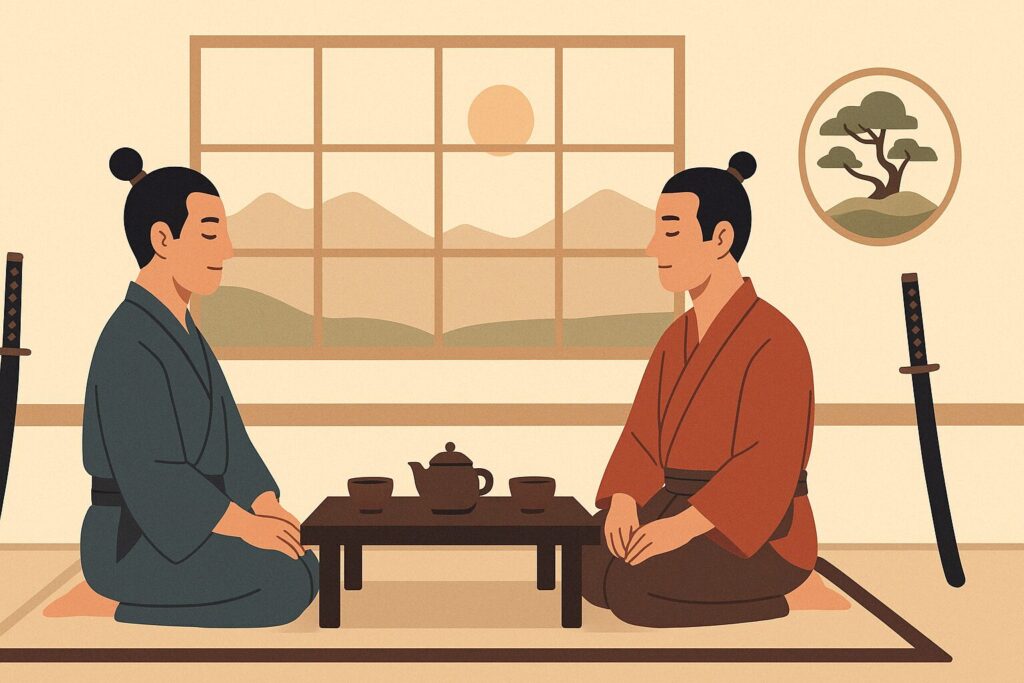武士道を英語で説明・紹介するための基本情報と、英会話に役立つ表現をシンプルでわかりやすい英語で紹介します。
英会話ダイアローグ・概要・10の質問を通して、武士道に関する英語表現を学びます。
英語
英会話ダイアローグを読む前に知っておくと良い前提知識と情報です。
- 武士道の基本概念
- 武士道は日本の武士階級による倫理・道徳体系
- 単なる戦闘技術ではなく、生き方の哲学として発展
- 七つの徳目
- 義(正義)、勇(勇気)、仁(慈悲)、礼(礼節)、誠(誠実)、名誉(名誉)、忠(忠誠)
- これらの価値観が武士の行動指針となった
- 禅仏教との関係
- 禅の思想が武士道に大きな影響を与えた
- 精神統一、無我、死の受容などの概念
- 新渡戸稲造の「武士道」
- 1900年に英語で書かれた「Bushido: The Soul of Japan」
- 武士道を西洋に紹介した重要な著作
- 現代への影響
- 日本のビジネス文化や社会規範に今も影響
- 会社への忠誠心、責任感、感情の抑制、他者への敬意など
2人が武士道について、話しています。
武士道の基本的な考え方、歴史、現代社会への影響などを話題にしています。
会話 / dialogue

Hey Key, have you ever read about Bushidō?

Yeah, a little. That’s the samurai code, right? Why do you ask?

Lately I’ve been really interested in it. I watched a film about samurai, and it made me want to know more.

That’s cool. Bushidō is more than just fighting—it’s a whole philosophy.

Exactly! I was surprised to learn that it focuses on things like honesty, kindness, and loyalty.

Yes, those are some of its core values. The seven main ones include justice, courage, and respect too.

Right. I especially like how they value honor so highly. It’s like they lived for something greater than themselves.

True. And it wasn’t just for war. Even during peaceful times, like in the Edo period, Bushidō guided how samurai lived.

Interesting. So it became more about character than just fighting?

Exactly. They studied arts, practiced tea ceremony, and followed strict manners. It was a kind of moral training.

I also read that Zen Buddhism influenced their mindset—like staying calm and accepting death.

That’s right. Zen helped samurai train their spirit, not just their body.

And now, people still follow those ideas, don’t they?

Yes, even today, Bushidō values are in business culture—like loyalty to your company or working hard without giving up.

I can see that. I’ve noticed how seriously people in Japan take responsibility.

It’s part of that Bushidō spirit. Also, it teaches people to control their emotions and respect others.

I feel like we could all learn from that. The world could use more kindness and respect.

Agreed. And thanks to writers like Nitobe Inazō, Bushidō became known worldwide.

Oh, he wrote Bushidō: The Soul of Japan, right? I’m thinking of reading it.

You should. It explains Bushidō in a way that Western readers can understand too.

Thanks. You know, learning about Bushidō makes me want to live with more purpose.

That’s what’s amazing about it. It’s not just history—it can still inspire people today.

Totally. I might even try meditating like the samurai did!

Great idea! Next time, let’s visit a Zen temple together.

Yes, let’s do that. I want to keep exploring this path.
概要 / Overview
「武士道」について、理解を深めるための「英語での概要」です。
武士道

What Is Bushidō?
Bushidō is the traditional code of the samurai in Japan. It means “the way of the warrior.” Samurai were warriors who served their lords and followed a strict set of rules. Bushidō taught them how to live with honor, courage, and loyalty. It was not just about fighting—it was about being a good and honest person.
The Main Values of Bushidō
Bushidō has seven main values: justice (gi), courage (yū), kindness (jin), respect (rei), honesty (makoto), honor (meiyo), and loyalty (chūgi). These values helped samurai make decisions and live with purpose. Even today, many Japanese people respect these ideas in daily life, business, and relationships.
Influence of Zen and Confucianism
Bushidō was influenced by Zen Buddhism and Confucianism. Zen taught samurai to stay calm and face death without fear. Confucianism taught respect for others and strong moral values. These ideas helped samurai train their minds as well as their bodies.
Bushidō in the Modern World
Today, Bushidō is still important in Japan. People admire the samurai spirit—being honest, respectful, and responsible. Bushidō is also known around the world because of books like Bushidō: The Soul of Japan by Nitobe Inazō. Even now, Bushidō continues to inspire people to live with discipline and pride.
10の質問 / 10 questions
「武士道」について、理解を深めるための「英語での10の質問」です。
1: What is Bushidō?
Bushidō is the traditional code of the samurai in Japan. It teaches how to live with honor, loyalty, and respect.
2: When did Bushidō begin?
Bushidō began around the 12th century, during the time of the early samurai in Japanese history.
3: What does the word “Bushidō” mean?
The word “Bushidō” means “the way of the warrior” in Japanese.
4: Who followed Bushidō?
Samurai, the warrior class in Japan, followed the rules and spirit of Bushidō.
5: What are the main values of Bushidō?
The main values include justice, courage, kindness, respect, honesty, honor, and loyalty.
6: Was Bushidō only about fighting?
No, Bushidō was also about personal character, self-discipline, and doing what is right.
7: How did Zen Buddhism influence Bushidō?
Zen Buddhism helped samurai stay calm, accept death, and train their minds.
8: Is Bushidō still important today?
Yes, the spirit of Bushidō still influences Japanese culture, especially in business and education.
9: Who introduced Bushidō to the world?
Nitobe Inazō introduced Bushidō to the world through his book Bushidō: The Soul of Japan.
10: What can we learn from Bushidō today?
We can learn to live with honesty, respect, and responsibility in our daily lives.

和訳付
会話 / dialogue

Hey Key, have you ever read about Bushidō?
やあキー、君は武士道について読んだことある?

Yeah, a little. That’s the samurai code, right? Why do you ask?
ああ、ちょっとね。侍の生き方のことだよね? どうして?

Lately I’ve been really interested in it. I watched a film about samurai, and it made me want to know more.
最近すごく興味があるんだ。侍の映画を見て、もっと詳しく知りたくなったんだよね。

That’s cool. Bushidō is more than just fighting—it’s a whole philosophy.
いいね。武士道って戦うだけじゃなくて、ひとつの哲学みたいなものだよ。

Exactly! I was surprised to learn that it focuses on things like honesty, kindness, and loyalty.
そうそう!正直さとか、思いやり、忠誠心を重視してるって知って驚いたよ。

Yes, those are some of its core values. The seven main ones include justice, courage, and respect too.
うん、それが中心的な価値観だね。他にも正義や勇気、尊敬とか、全部で7つあるんだよ。

Right. I especially like how they value honor so highly. It’s like they lived for something greater than themselves.
そうだね。特に名誉をすごく大事にするところが好きだな。自分自身よりも大切な何かのために生きてるって感じがするよ。

True. And it wasn’t just for war. Even during peaceful times, like in the Edo period, Bushidō guided how samurai lived.
本当だね。それに戦争のためだけじゃなかったんだよ。江戸時代みたいな平和な時代にも、武士道は侍の生き方を導いていたんだ。

Interesting. So it became more about character than just fighting?
面白いね。それじゃ、戦うことよりも、人格を磨くことが中心になったの?

Exactly. They studied arts, practiced tea ceremony, and followed strict manners. It was a kind of moral training.
その通りだよ。芸術を学んだり、茶道をしたり、厳しい礼儀作法を守ったりして、道徳的な修行みたいになっていったんだ。

I also read that Zen Buddhism influenced their mindset—like staying calm and accepting death.
あと禅の影響で、心を落ち着かせたり死を受け入れるって考え方になったって読んだよ。

That’s right. Zen helped samurai train their spirit, not just their body.
そうそう。禅は侍に身体だけじゃなくて精神の鍛え方も教えたんだよ。

And now, people still follow those ideas, don’t they?
今でも、そういう考え方を守ってる人がいるよね?

Yes, even today, Bushidō values are in business culture—like loyalty to your company or working hard without giving up.
そうだね。現代でもビジネス文化に武士道の価値観があるよ。例えば会社への忠誠心とか、あきらめずに頑張ることとか。

I can see that. I’ve noticed how seriously people in Japan take responsibility.
それは感じるな。日本人って本当に責任感を大事にしているなって思うよ。

It’s part of that Bushidō spirit. Also, it teaches people to control their emotions and respect others.
それも武士道精神の一部だね。他にも自分の感情をコントロールしたり、他人を尊重したりすることを教えているよ。

I feel like we could all learn from that. The world could use more kindness and respect.
みんなが武士道から学べることは多いよね。世界にはもっと優しさと敬意が必要だよ。

Agreed. And thanks to writers like Nitobe Inazō, Bushidō became known worldwide.
同感だよ。新渡戸稲造みたいな作家のおかげで、武士道は世界にも知られるようになったしね。

Oh, he wrote Bushidō: The Soul of Japan, right? I’m thinking of reading it.
ああ、『武士道―日本の魂』を書いた人だよね?僕も読んでみようと思ってるんだ。

You should. It explains Bushidō in a way that Western readers can understand too.
それいいね。欧米の人にも分かりやすく武士道を説明してくれてるよ。

Thanks. You know, learning about Bushidō makes me want to live with more purpose.
ありがとう。武士道を学んでると、もっと目的意識を持って生きたくなるんだよね。

That’s what’s amazing about it. It’s not just history—it can still inspire people today.
そこが武士道のすごいところだよ。ただの歴史じゃなくて、今でも人に影響を与えるところがね。

Totally. I might even try meditating like the samurai did!
本当にそうだよね。侍がやってたみたいに、僕も禅の瞑想をやってみようかな!

Great idea! Next time, let’s visit a Zen temple together.
それいいね!今度、一緒に禅寺に行ってみようよ。

Yes, let’s do that. I want to keep exploring this path.
うん、ぜひそうしよう。この道をもっと探求してみたいんだ。
概要 / Overview
武士道

What Is Bushidō?
Bushidō is the traditional code of the samurai in Japan. It means “the way of the warrior.” Samurai were warriors who served their lords and followed a strict set of rules. Bushidō taught them how to live with honor, courage, and loyalty. It was not just about fighting—it was about being a good and honest person.
武士道は、日本の侍が守っていた伝統的な行動のルールです。「武士の道」という意味です。侍は主君に仕える戦士で、厳しい決まりを守っていました。武士道は、名誉、勇気、忠誠を持って生きる方法を教えていました。戦うことだけでなく、正直で立派な人になることが大切でした。
The Main Values of Bushidō
Bushidō has seven main values: justice (gi), courage (yū), kindness (jin), respect (rei), honesty (makoto), honor (meiyo), and loyalty (chūgi). These values helped samurai make decisions and live with purpose. Even today, many Japanese people respect these ideas in daily life, business, and relationships.
武士道には、7つの大切な価値があります。それは、正義(義)、勇気(勇)、思いやり(仁)、礼儀(礼)、正直(誠)、名誉(名誉)、忠義(忠義)です。これらの価値は、侍が正しい判断をし、目標を持って生きる助けになりました。現代でも、日本の多くの人が日常生活や仕事、人間関係の中でこれらの考えを大切にしています。
Influence of Zen and Confucianism
Bushidō was influenced by Zen Buddhism and Confucianism. Zen taught samurai to stay calm and face death without fear. Confucianism taught respect for others and strong moral values. These ideas helped samurai train their minds as well as their bodies.
武士道は、禅宗と儒教の影響を受けました。禅は、侍に心を落ち着け、死を恐れずに受け入れることを教えました。儒教は、人を尊重することや道徳の大切さを教えました。こうした考えが、侍の心と体の両方を鍛えることにつながったのです。
Bushidō in the Modern World
Today, Bushidō is still important in Japan. People admire the samurai spirit—being honest, respectful, and responsible. Bushidō is also known around the world because of books like Bushidō: The Soul of Japan by Nitobe Inazō. Even now, Bushidō continues to inspire people to live with discipline and pride.
今日でも、武士道は日本で大切にされています。人々は、正直で、礼儀正しく、責任感のある「侍の精神」を尊敬しています。また、新渡戸稲造の『武士道』のような本のおかげで、世界中にもその考えが知られています。今でも武士道は、人々が誇りと規律をもって生きることに影響を与えています。
10の質問 / 10 questions
1: What is Bushidō?
武士道とは何ですか?
Bushidō is the traditional code of the samurai in Japan. It teaches how to live with honor, loyalty, and respect.
武士道は日本の侍の伝統的な行動規範です。名誉、忠誠、敬意を持って生きる方法を教えます。
2: When did Bushidō begin?
武士道はいつ始まりましたか?
Bushidō began around the 12th century, during the time of the early samurai in Japanese history.
武士道は12世紀ごろ、日本の初期の侍の時代に始まりました。
3: What does the word “Bushidō” mean?
「武士道」という言葉の意味は何ですか?
The word “Bushidō” means “the way of the warrior” in Japanese.
「武士道」という言葉は日本語で「武士の道」という意味です。
4: Who followed Bushidō?
誰が武士道に従っていたのですか?
Samurai, the warrior class in Japan, followed the rules and spirit of Bushidō.
日本の武士階級である侍が、武士道の規範と精神に従っていました。
5: What are the main values of Bushidō?
武士道の主な価値観は何ですか?
The main values include justice, courage, kindness, respect, honesty, honor, and loyalty.
主な価値観には、正義、勇気、思いやり、礼儀、正直、名誉、忠義があります。
6: Was Bushidō only about fighting?
武士道は戦いだけのものですか?
No, Bushidō was also about personal character, self-discipline, and doing what is right.
いいえ。武士道は人間性や自己規律、正しい行いを重視するものでもありました。
7: How did Zen Buddhism influence Bushidō?
禅宗は武士道にどのような影響を与えましたか?
Zen Buddhism helped samurai stay calm, accept death, and train their minds.
禅宗は、侍が心を落ち着け、死を受け入れ、精神を鍛える助けとなりました。
8: Is Bushidō still important today?
武士道は今日でも重要ですか?
Yes, the spirit of Bushidō still influences Japanese culture, especially in business and education.
はい。武士道の精神は今でも日本文化、特にビジネスや教育に影響を与えています。
9: Who introduced Bushidō to the world?
誰が武士道を世界に紹介しましたか?
Nitobe Inazō introduced Bushidō to the world through his book Bushidō: The Soul of Japan.
新渡戸稲造が『武士道―日本の魂』という著書を通して、武士道を世界に紹介しました。
10: What can we learn from Bushidō today?
現代の私たちは武士道から何を学べますか?
We can learn to live with honesty, respect, and responsibility in our daily lives.
私たちは日々の生活の中で、正直さ、敬意、責任感を持って生きることを学ぶことができます。

words & phrases
英会話ダイアローグと関連情報に出てきた単語・フレーズです(例文は各3つ)。

value : 名詞
意味: 価値、重要性。The importance or worth of something.
(武士道で重視される正義や誠実などの道徳的な価値)
例文:
- The main values of Bushidō include honor and loyalty.
「武士道の主な価値には名誉や忠義が含まれます。」 - Many families teach strong moral values to their children.
「多くの家庭は子どもたちに強い道徳的価値を教えます。」 - He doesn’t share the same values as his parents.
「彼は両親と同じ価値観を持っていません。」
honor : 名詞
意味: 名誉、誇り。High respect or great reputation earned through good actions.
(武士が命よりも大切にした名誉)
例文:
- The samurai lived with honor and discipline.
「侍は名誉と規律を持って生きていました。」 - It is an honor to serve my country.
「国に仕えることは名誉なことです。」 - He received a medal of honor for his bravery.
「彼は勇敢さのために名誉勲章を受けました。」
mindset : 名詞
意味: 考え方、精神的な態度。A set of beliefs or a way of thinking.
(禅によって鍛えられる侍の精神や死生観)
例文:
- Bushidō helped shape the samurai’s mindset.
「武士道は侍の考え方を形作りました。」 - A growth mindset helps people overcome challenges.
「成長志向の考え方は困難を乗り越える助けになります。」 - You need the right mindset to succeed.
「成功するには正しい考え方が必要です。」
take responsibility : フレーズ
意味: 責任を取る。To accept duty or blame for something.
(現代日本人が示す武士道的な責任感)
例文:
- Japanese people often take responsibility seriously.
「日本人はよく責任を真剣に受け止めます。」 - He must take responsibility for his mistake.
「彼は自分のミスに責任を取らなければなりません。」 - As a leader, she always takes responsibility.
「リーダーとして、彼女はいつも責任を引き受けます。」
inspire : 動詞
意味: 刺激を与える、感動させる。To make someone feel interested or motivated.
(武士道が現代の人々に与える影響や感動)
例文:
- Bushidō continues to inspire people today.
「武士道は今でも人々に感動を与え続けています。」 - Her story inspired me to try harder.
「彼女の話は私にもっと頑張ろうと思わせてくれました。」 - Good leaders inspire their teams to do great things.
「良いリーダーはチームに素晴らしいことをやらせる力を与えます。」
